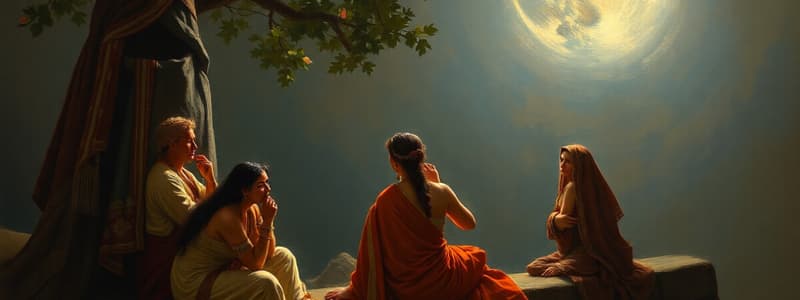Podcast
Questions and Answers
What is the primary belief associated with the concept of reincarnation?
What is the primary belief associated with the concept of reincarnation?
- The soul remains in a state of eternal rest after death.
- Reincarnation is exclusive to Buddhism.
- All souls attain moksha after their first life.
- The soul is reborn in a new body based on karma from past lives. (correct)
Which group is considered outside the traditional caste system in Hinduism?
Which group is considered outside the traditional caste system in Hinduism?
- Dalits (correct)
- Kshatriyas
- Brahmins
- Vaishyas
Which statement about the Gupta Empire during India's Golden Age is true?
Which statement about the Gupta Empire during India's Golden Age is true?
- It focused solely on political centralization.
- It witnessed significant advancements in science and mathematics. (correct)
- It was primarily known for its military conquests.
- It was closely tied to the spread of Christianity.
What role did the Kshatriyas play in the caste system?
What role did the Kshatriyas play in the caste system?
What fundamental teaching did Siddhartha Gautama, or the Buddha, emphasize in his teachings?
What fundamental teaching did Siddhartha Gautama, or the Buddha, emphasize in his teachings?
Flashcards
Reincarnation
Reincarnation
The belief that the soul is reborn into a new body after death.
Caste System
Caste System
A rigid social hierarchy in Hinduism with four main classes: Brahmins, Kshatriyas, Vaishyas, and Shudras.
Shiva
Shiva
The Hindu god of destruction and transformation, part of the Trimurti.
Buddha
Buddha
Signup and view all the flashcards
Gupta Empire
Gupta Empire
Signup and view all the flashcards
Study Notes
Reincarnation
- Belief in rebirth after death, a core concept in Hinduism and Buddhism.
- The soul is reborn into a new body based on karma (actions from past lives).
Caste System
- A rigid social hierarchy in Hinduism.
- Four main social classes (varnas): Brahmins (priests), Kshatriyas (warriors), Vaishyas (merchants), and Shudras (laborers).
- Dalits (Untouchables) are outside the caste system.
- Birth determines caste, occupation, and social status.
- No social mobility within the lifetime.
Shiva the Destroyer
- Hindu god, part of the Trimurti (Brahma the creator, Vishnu the preserver).
- Represents destruction and transformation for renewal.
Kshatriyas
- Warrior and ruler class in the caste system.
- Responsible for protection and governance.
Buddha
- Siddhartha Gautama, founder of Buddhism.
- Achieved enlightenment and taught the Four Noble Truths and Eightfold Path.
Gupta Empire
- India's "Golden Age" (320-550 CE).
- Advancement in science, mathematics (concept of zero), literature, and art.
Maurya Empire
- First large Indian empire (321-185 BCE), founded by Chandragupta Maurya.
- Known for Emperor Ashoka and his support of Buddhism.
Dharma
- In Hinduism: Duty or moral order based on one's caste and stage of life.
- In Buddhism: Universal truth and the Buddha's teachings.
Siddhartha Gautama
- Indian prince who left his life of luxury to find enlightenment.
- Became the Buddha, founder of Buddhism.
Basic Principles of Buddhism and Hinduism
- Buddhism: Four Noble Truths, Eightfold Path, goal of achieving Nirvana.
- Hinduism: Karma, dharma, moksha (liberation), worship of many deities.
Maurya and Gupta Empires: Connections and Differences
- Connections: Both empires were large, promoting significant cultural and economic advancements.
- Differences: Different time periods (Maurya was earlier); Maurya focused more on political unification, Gupta on cultural achievements.
Studying That Suits You
Use AI to generate personalized quizzes and flashcards to suit your learning preferences.




